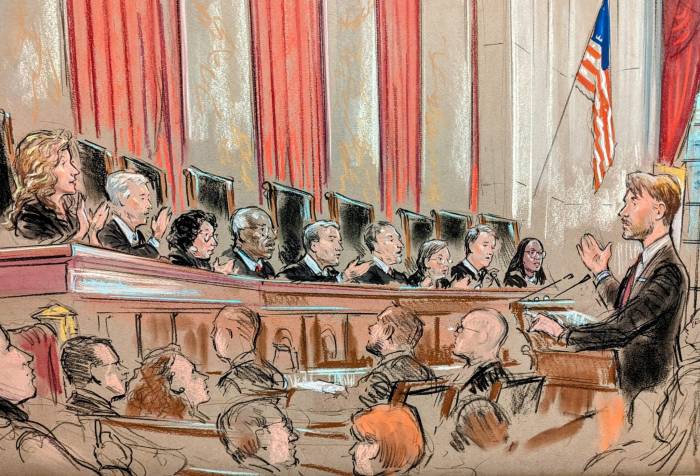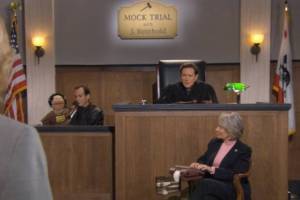Instead of spending the evening reading
SCOTUS oral arguments,
this week I tuned in to the Moody and Cargill hearings on the cspans.
The future of social media
First up:
Moody v. NetChoice. I
talked about this last month after reading the
/r/law mods' funny/distressing amicus brief.
The tldr: Texas and Florida passed
laws that would make social media platforms like Facebook and Twitter civilly liable for removing or obscuring user content based on viewpoint. So if I went on Tiktok and said, "right-handed people smell bad" or "deport all gingers", the platform would face stiff penalties for removing my trollish posts (however accurate they may be).
A lot of the media commentary after oral arguments fit this mold:
"SCOTUS justices appear lost in debate about technology". While I don't think the justices demonstrated extreme savvy with respect to the subject matter, I don't think they were confounded by the technical elements of the discussion.
Related to the Supreme Court's fitness to evaluate internet-age questions lies the uncertain applicability of physical-world precedent.
Moody oral arguments discussed
a handful of related decisions:
- A mall owner could not remove those people who stand with a sign or table to advertise a political or religious perspective.
- Military recruiters could not be excluded from a law school job fair.
- A St. Patrick's Day parade could exclude an LGBT float.
Conduct vs expression
One of central questions was whether moderation is protected expression or simply conduct that can be regulated and litigated. Speaking on behalf of the petitioners,
Henry Whitaker contended that moderation was not an editorial action because, unlike a newspaper op-ed, it is not performed by a human. Justice Barrett and, later, Respondent's counsel Paul Clement, both indicated that algorithms are written by people. Of course, the conversation then went to LLMs and the justices realized they were definitely out of their depth.
Twitter bank
Last year Elon
indicated his interest in getting into banking as part of his X master plan. And that's common for the big platforms; Facebook has a Craigslist and Google Maps has user comments and payment integration. The
variation and integration of big tech product offerings seemed to have frustrated the court's attempt to have a clear discussion on the matter, and they said so.
And there's this tricky little dichotomy:
- A platform like Truth Social is primarily a social/political commentary forum (and billboard for investing in gold). And so while Truth would intuitively seem like a place to require unregulated discussion, it has the strongest freedom of expression interest and would thereby be a candidate for First Amendment protection with respect to moderation.
- Etsy, on the other hand, is a platform for selling handmade items. There's every reason for it to not allow trolling or political discussions in vendor comments and yet it can't claim that it has a expressive interest in doing so.
When asked, Whitaker said that, for example, "democrat.com" would have a First Amendment right to regulate its comment section.
Along the lines of Truth Social and Etsy, some of the justices seemed concerned about the impact on direct communication such as email services and DMs. It certainly seems more disruptive for a messaging service to eat select emails based on content ("you didn't get my Bingmail message about how much I hate Bingmail?"). On the other hand,
I'm not sure Twitter should be compelled to deliver DMs that use no-no words or say "kys irl" or whatever.
It's just an injunction
Justice Gorsuch asked Clement why they brought a facial challenge to the Texida laws rather than an as-applied challenge. There's far more jurisprudence there than I'm familiar with, but the core of it seems to be that
success with a facial challenge requires that there be no legitimate application of the law. Clement asserted this unequivocally but perhaps chose a more difficult battle than he needed.
This discussion also touched on the fact that
this hearing was simply about temporary relief as the thing is fully litigated in the lower courts.
Takeaways
Probably the easiest way out here is to uphold the injuction, provide some gentle guidance, and wait for it to come back. And yet
I almost want to see the major social media platforms pull out of Florida and Texas like PornHub did with the ID law and IVF did with Alabama's liability ruling.
"A curved metal lever"
Way back in the 30s, Congress passed a law banning 'machinegun' ownership. Commonly, this would be a firearm that emits multiple rounds per single pull of the trigger. Rather than phrase the statute exactly that way, the legislature
instead referred to the "function of the trigger". So Al Capone couldn't get away with carrying around Tommy Guns that had push triggers. Since then, there have been numerous attempts to circumvent this law with ingenuity and fun names like the "autoglove" and "fishing reel". These devices have been determined to be in violation of 26 U.S.C. 5845(b) and thereby dealt with.
Until one evening in 2017 when a man killed a lot of people at a concert in Las Vegas. He used a then-legal/now-infamous device called a bump stock to effect a rate of fire common to fully-automatic weapons. Bump stocks use the recoil of the gun to bounce the firearm against the shooter's trigger finger and thereby enable high fire rates from a semiautomatic rifle.
Not long after, the ATF reversed an earlier opinion and
indicated that bump stocks fit the machinegun definition and all existing devices would be condemned. A guy in Texas didn't do that and so we
ended up with Garland v. Cargill.
Arguments
The DoJ, represented by Brian Fletcher, asserted that the
"function of the trigger" refers to the shooter's general input into the firearm. In essence, by applying continuous pressure to the stock and/or front grip, the initial trigger pull is the single input that initiates the sequence of multiple rounds being fired. His analogies included a weapon that is designed to have a "hold to fire" button which respondent admitted would be prohibited.
Respondent, represented by the very busy Jonathan Mitchell, largely rested his argument on two terms used in the original statute:
- The law's "function of the trigger" terminology refers to a mechanical occurrence, the intent of the shooter has no bearing. It is up to Congress to fix this if it's no longer accurate.
- The trigger is a specific component of the firearm, so the mechanical inputs that permit bump stock shooting are beyond the scope of the machinegun law.
Q&A (colloquy)
|
|
|
"I'm going to recoil like this. If your finger is there and causes another trigger pull it's your own fault." |
Justice Kagan had this interaction with Mitchell (paraphrasing):
Kagan: A single button (rather than the oft-repeated "curved metal lever") that results in multiple rounds being fired is a machine gun?
Mitchell: Yes.
Kagan: What if you hold down two buttons.
Mitchell: Also yes.
Kagan: What about one button and a trigger?
Mitchell, after saying it depends on how you define "trigger": Yes.
Kagan: What about an accessory that you push on and a trigger?
Mitchell probably had nowhere to go on this one and resorted to saying that
a bump stock-equipped firearm doesn't require additional input to function as a semi and this is the key difference. It seems like this could be mapped back to Kagan's original examples and I'm not sure why that didn't happen (absent a specific recollection of where the conversation went I assume Gorsuch or Roberts cut in to redirect conversation).
Justice Gorsuch wrung his hands about the poor
bump stock owners that might not be aware of the 2018 regulation and would become accidental felons. He mockingly said that people don't read firearms regulations in their spare time. However people feel about the
Cargill debate, I interacted with very few firearms enthusiasts who did not go out of their way to be abreast of the current state of regulations. Things like loophole windows for high-capacity magazines, the strict meaning of "assault rifle" (select fire), the supposed meaninglessness of "assault weapon" (first used by Reagan iirc), that a belt loop is almost identical to a bump stock (it's not). And beyond the awareness that comes with being an enthusiast, the Vegas/bump stock news saturated the media until the ATF ostensibly addressed the issue. While neither mine nor Justice Gorsuch's experience is comprehensive, I simply cannot believe he made that statement in good faith.
Justice Sotomayor referenced a precedent that seems kind of trivial but also is important; basically that
SCOTUS shouldn't rule in a way that yields a piece of legislation ineffective. While the statute would still ban conventional automatic weapons, the existence of a viable alternative would render it largely meaningless.
Justice Alito asked Mitchell why a machinegun might be banned but not a bump stock. Mitchell waved his hand at "people with disabilities". I didn't get the impression that anyone in the room thought that the authors of the 1930s law would be inclined to see Al Capone running around with a bump stock AR.
Takeaways
Before today, I expected this one to go one of three ways:
- The rather unambiguous fact that bump stocks fire one round per trigger movement.
- Some Chevron-related thing about how the ATF overreached into legislative powers.
- A 2A argument begged by Bruen.
If I had read the briefs I would probably have realized #2 wasn't being argued. I guess whether or not a rifle with a bump stock fits the machinegun definition is a reasonable determination for the ATF to *attempt* to make.
One of the justices asked Mitchell about the 2A argument and he basically said, 'nah'. I wonder if he considered the "curved metal lever" argument to be stronger than
advocating that the court declare the original statute incompatible with founding-era gun control. Perhaps neither the 2A nor the originalism crowd wants to hitch their wagons to the Vegas shooting. So we don't get the "histories and traditions" confrontation
teased in Bruen. At least we have
Rahimi.
So that leaves #1. Based on what I heard today, I guess some of the justices are considering that 26 U.S.C. 5845(b) is meant to cover burst fire and fully-automatic weapons regardless of how they are activated. There's
a rather strong case to be made for having Congress clear up the ambiguity but if it didn't happen in early 2018 it certainly isn't going to happen now. Oh yeah, the GFY24 budget deadline is like Friday or something.
Some posts from this site with similar content.
(and some select mainstream web). I haven't personally looked at them or checked them for quality, decency, or sanity. None of these links are promoted, sponsored, or affiliated with this site. For more information, see
.







